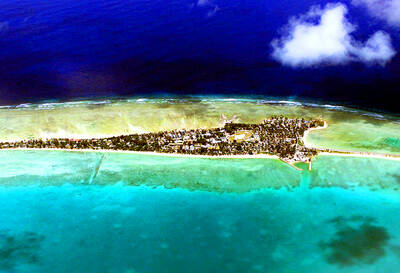Myanmar’s military government announced an amnesty on Friday night for more than 6,000 prisoners, but did not mention whether any political detainees would be among those released.
State radio and television announced that the convicts from various prisons would be released starting yesterday. The brief announcement said that 6,313 prisoners were being freed in recognition of their good conduct and so that they would be able to participate in a general election planned for next year.
Human rights groups estimate that the regime holds more than 2,100 political detainees, including pro-democracy leader Aung San Suu Kyi, who is under house arrest. The Nobel Peace Prize laureate has spent 13 of the past 19 years in detention without trial.
When the junta freed 9,002 prisoners last September, only about a dozen were political detainees.
In recent months, the junta’s courts have sentenced more than 100 dissidents, including some of the country’s most prominent activists, to prison terms that would keep them incarcerated well past the 2010 polls. The junta says the elections will restore democracy, but critics charge they will be a sham to keep the military in control.
The top UN envoy to Myanmar, Ibrahim Gambari, who recently visited the country, told reporters at UN headquarters in New York that he had not received any official communique from the government and was waiting to see how many of the prisoners were criminals and how many were political prisoners.
“At the same time, I believe it’s fair to welcome the release of prisoners, particularly political prisoners,” Gambari said.
UN spokeswoman Michele Montas echoed Gambari, saying: “It still remains unclear whether and how many political prisoners this deal may include.”
“We encourage the government to release all political prisoners, including Daw Aung San Suu Kyi,” she said.
Meanwhile, UN Secretary-General Ban Ki-moon is to decide whether to visit Myanmar, after Gambari reported little progress in political dialogue with the country’s government on Friday.
After a closed-door briefing from m Gambari, who visited the country last month, Security Council members said it would be up to Ban to decide if a visit would be productive.
French ambassador Jean-Maurice Ripert said: “It’s up to the secretary-general to decide if the time is right and under what conditions he wants to go.”
British ambassador John Sawers said: “Should the secretary-general decide he will visit, that will be a welcome step ... It’s up to [him] to go. He’s not going to be sent there or refused support.”
Montas said no decision on the trip had been taken.
Gambari, who is tasked with bringing opposition leaders and the government together, met last month with detained democracy leader Aung San Suu Kyi, but failed to secure a meeting with Myanmar’s head of state Senior General Than Shwe. Gambari said his visit had been “more balanced,” because he met with opposition and minority representatives.

DISASTER: The Bangladesh Meteorological Department recorded a magnitude 5.7 and tremors reached as far as Kolkata, India, more than 300km away from the epicenter A powerful earthquake struck Bangladesh yesterday outside the crowded capital, Dhaka, killing at least five people and injuring about a hundred, the government said. The magnitude 5.5 quake struck at 10:38am near Narsingdi, Bangladesh, about 33km from Dhaka, the US Geological Survey (USGS) said. The earthquake sparked fear and chaos with many in the Muslim-majority nation of 170 million people at home on their day off. AFP reporters in Dhaka said they saw people weeping in the streets while others appeared shocked. Bangladesh Interim Leader Muhammad Yunus expressed his “deep shock and sorrow over the news of casualties in various districts.” At least five people,

ON THE LAM: The Brazilian Supreme Court said that the former president tried to burn his ankle monitor off as part of an attempt to orchestrate his escape from Brazil Former Brazilian president Jair Bolsonaro — under house arrest while he appeals a conviction for a foiled coup attempt — was taken into custody on Saturday after the Brazilian Supreme Court deemed him a high flight risk. The court said the far-right firebrand — who was sentenced to 27 years in prison over a scheme to stop Brazilian President Luiz Inacio Lula da Silva from taking office after the 2022 elections — had attempted to disable his ankle monitor to flee. Supreme Court judge Alexandre de Moraes said Bolsonaro’s detention was a preventive measure as final appeals play out. In a video made

It is one of the world’s most famous unsolved codes whose answer could sell for a fortune — but two US friends say they have already found the secret hidden by Kryptos. The S-shaped copper sculpture has baffled cryptography enthusiasts since its 1990 installation on the grounds of the CIA headquarters in Virginia, with three of its four messages deciphered so far. Yet K4, the final passage, has kept codebreakers scratching their heads. Sculptor Jim Sanborn, 80, has been so overwhelmed by guesses that he started charging US$50 for each response. Sanborn in August announced he would auction the 97-character solution to K4

SHOW OF FORCE: The US has held nine multilateral drills near Guam in the past four months, which Australia said was important to deter coercion in the region Five Chinese research vessels, including ships used for space and missile tracking and underwater mapping, were active in the northwest Pacific last month, as the US stepped up military exercises, data compiled by a Guam-based group shows. Rapid militarization in the northern Pacific gets insufficient attention, the Pacific Center for Island Security said, adding that it makes island populations a potential target in any great-power conflict. “If you look at the number of US and bilateral and multilateral exercises, there is a lot of activity,” Leland Bettis, the director of the group that seeks to flag regional security risks, said in an